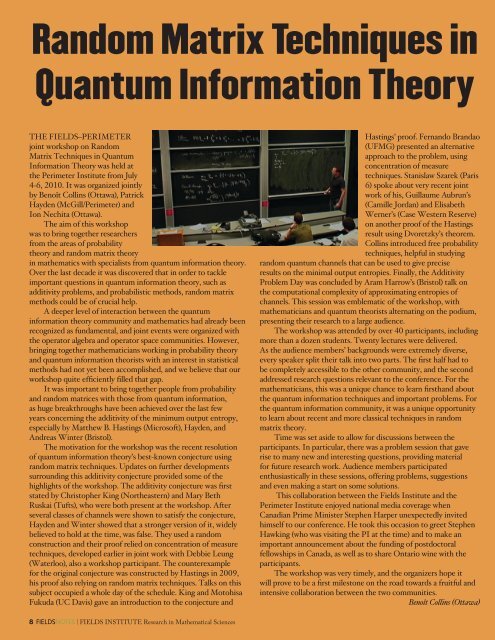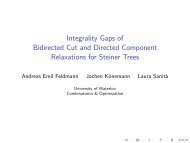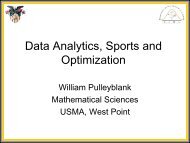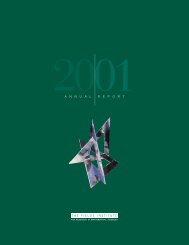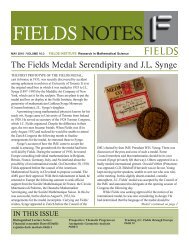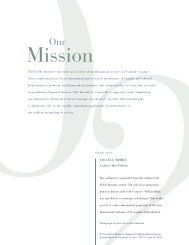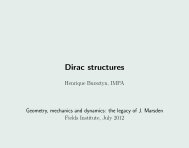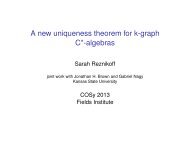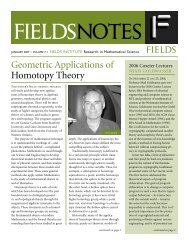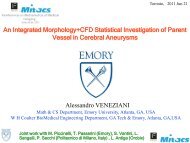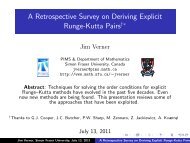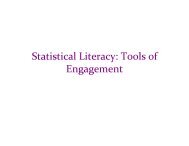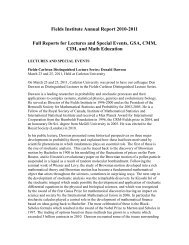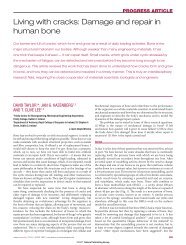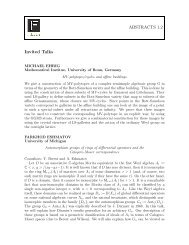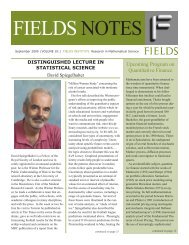SCIENTIFIC ACTIVITIES - Fields Institute - University of Toronto
SCIENTIFIC ACTIVITIES - Fields Institute - University of Toronto
SCIENTIFIC ACTIVITIES - Fields Institute - University of Toronto
You also want an ePaper? Increase the reach of your titles
YUMPU automatically turns print PDFs into web optimized ePapers that Google loves.
Random Matrix Techniques in<br />
Quantum Information Theory<br />
THE FIELDS–PERIMETER<br />
joint workshop on Random<br />
Matrix Techniques in Quantum<br />
Information Theory was held at<br />
the Perimeter <strong>Institute</strong> from July<br />
4-6, 2010. It was organized jointly<br />
by Benoît Collins (Ottawa), Patrick<br />
Hayden (McGill/Perimeter) and<br />
Ion Nechita (Ottawa).<br />
The aim <strong>of</strong> this workshop<br />
was to bring together researchers<br />
from the areas <strong>of</strong> probability<br />
theory and random matrix theory<br />
in mathematics with specialists from quantum information theory.<br />
Over the last decade it was discovered that in order to tackle<br />
important questions in quantum information theory, such as<br />
additivity problems, and probabilistic methods, random matrix<br />
methods could be <strong>of</strong> crucial help.<br />
A deeper level <strong>of</strong> interaction between the quantum<br />
information theory community and mathematics had already been<br />
recognized as fundamental, and joint events were organized with<br />
the operator algebra and operator space communities. However,<br />
bringing together mathematicians working in probability theory<br />
and quantum information theorists with an interest in statistical<br />
methods had not yet been accomplished, and we believe that our<br />
workshop quite efficiently filled that gap.<br />
It was important to bring together people from probability<br />
and random matrices with those from quantum information,<br />
as huge breakthroughs have been achieved over the last few<br />
years concerning the additivity <strong>of</strong> the minimum output entropy,<br />
especially by Matthew B. Hastings (Micros<strong>of</strong>t), Hayden, and<br />
Andreas Winter (Bristol).<br />
The motivation for the workshop was the recent resolution<br />
<strong>of</strong> quantum information theory’s best-known conjecture using<br />
random matrix techniques. Updates on further developments<br />
surrounding this additivity conjecture provided some <strong>of</strong> the<br />
highlights <strong>of</strong> the workshop. The additivity conjecture was first<br />
stated by Christopher King (Northeastern) and Mary Beth<br />
Ruskai (Tufts), who were both present at the workshop. After<br />
several classes <strong>of</strong> channels were shown to satisfy the conjecture,<br />
Hayden and Winter showed that a stronger version <strong>of</strong> it, widely<br />
believed to hold at the time, was false. They used a random<br />
construction and their pro<strong>of</strong> relied on concentration <strong>of</strong> measure<br />
techniques, developed earlier in joint work with Debbie Leung<br />
(Waterloo), also a workshop participant. The counterexample<br />
for the original conjecture was constructed by Hastings in 2009,<br />
his pro<strong>of</strong> also relying on random matrix techniques. Talks on this<br />
subject occupied a whole day <strong>of</strong> the schedule. King and Motohisa<br />
Fukuda (UC Davis) gave an introduction to the conjecture and<br />
8 FIELDSNOTES | FIELDS INSTITUTE Research in Mathematical Sciences<br />
Hastings’ pro<strong>of</strong>. Fernando Brandao<br />
(UFMG) presented an alternative<br />
approach to the problem, using<br />
concentration <strong>of</strong> measure<br />
techniques. Stanislaw Szarek (Paris<br />
6) spoke about very recent joint<br />
work <strong>of</strong> his, Guillaume Aubrun’s<br />
(Camille Jordan) and Elisabeth<br />
Werner’s (Case Western Reserve)<br />
on another pro<strong>of</strong> <strong>of</strong> the Hastings<br />
result using Dvoretzky’s theorem.<br />
Collins introduced free probability<br />
techniques, helpful in studying<br />
random quantum channels that can be used to give precise<br />
results on the minimal output entropies. Finally, the Additivity<br />
Problem Day was concluded by Aram Harrow’s (Bristol) talk on<br />
the computational complexity <strong>of</strong> approximating entropies <strong>of</strong><br />
channels. This session was emblematic <strong>of</strong> the workshop, with<br />
mathematicians and quantum theorists alternating on the podium,<br />
presenting their research to a large audience.<br />
The workshop was attended by over 40 participants, including<br />
more than a dozen students. Twenty lectures were delivered.<br />
As the audience members’ backgrounds were extremely diverse,<br />
every speaker split their talk into two parts. The first half had to<br />
be completely accessible to the other community, and the second<br />
addressed research questions relevant to the conference. For the<br />
mathematicians, this was a unique chance to learn firsthand about<br />
the quantum information techniques and important problems. For<br />
the quantum information community, it was a unique opportunity<br />
to learn about recent and more classical techniques in random<br />
matrix theory.<br />
Time was set aside to allow for discussions between the<br />
participants. In particular, there was a problem session that gave<br />
rise to many new and interesting questions, providing material<br />
for future research work. Audience members participated<br />
enthusiastically in these sessions, <strong>of</strong>fering problems, suggestions<br />
and even making a start on some solutions.<br />
This collaboration between the <strong>Fields</strong> <strong>Institute</strong> and the<br />
Perimeter <strong>Institute</strong> enjoyed national media coverage when<br />
Canadian Prime Minister Stephen Harper unexpectedly invited<br />
himself to our conference. He took this occasion to greet Stephen<br />
Hawking (who was visiting the PI at the time) and to make an<br />
important announcement about the funding <strong>of</strong> postdoctoral<br />
fellowships in Canada, as well as to share Ontario wine with the<br />
participants.<br />
The workshop was very timely, and the organizers hope it<br />
will prove to be a first milestone on the road towards a fruitful and<br />
intensive collaboration between the two communities.<br />
Benoît Collins (Ottawa)


